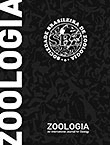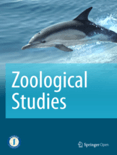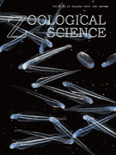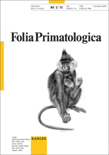
INTERNATIONAL JOURNAL OF PRIMATOLOGY
Scope & Guideline
Shaping the Future of Primate Studies
Introduction
Aims and Scopes
- Primate Behavior and Social Dynamics:
Research focusing on the social structures, behavioral patterns, and interactions among primate species, including studies on maternal care, social hierarchies, and interspecific relationships. - Conservation Biology:
Studies that assess the conservation status of primates, threats to their habitats, and strategies for their preservation, emphasizing the importance of biodiversity and ecosystem health. - Ecological Research:
Investigation into the ecological roles of primates, including their dietary habits, habitat use, and responses to environmental changes, which are crucial for understanding their survival. - Genetic and Evolutionary Studies:
Research that explores the genetic diversity, population structure, and evolutionary history of primate species, providing insights into their adaptability and conservation needs. - Human-Primate Interactions:
Examination of the impacts of human activities on primate populations, including studies on human-wildlife conflict, tourism, and conservation education. - Ethical and Cultural Perspectives:
Discussion of ethical issues related to primate research and conservation, including the role of cultural beliefs and practices in shaping conservation strategies.
Trending and Emerging
- Climate Change and Environmental Impact:
An emerging focus on how climate change affects primate habitats and behaviors, with research exploring the adaptability of primates to changing environmental conditions. - Technological Innovations in Primate Research:
Increasing incorporation of technology in primate research, such as drone-based monitoring and acoustic analysis, allowing for more precise data collection and analysis. - Conservation Strategies in Human-Modified Landscapes:
Growing interest in understanding how primates adapt to and coexist with human activities, emphasizing the need for effective conservation strategies in anthropogenic environments. - Ethical Considerations in Primate Research and Conservation:
A rising emphasis on the ethical dimensions of primate research, including discussions on welfare, rights, and the implications of conservation practices. - Interdisciplinary Approaches to Primate Research:
An increasing trend towards interdisciplinary studies that integrate insights from anthropology, ecology, sociology, and conservation science to address complex challenges facing primates.
Declining or Waning
- Captive Primate Studies:
Research focusing on primates in captivity has seen a decrease, possibly due to a shift towards field studies that emphasize the natural behaviors and conservation of wild populations. - Morphological Studies:
There has been a waning interest in purely morphological analyses of primates, as the focus has shifted more towards behavioral and ecological studies that provide insights into species adaptation and survival. - Traditional Taxonomy and Classification:
The emphasis on traditional taxonomic studies appears to be declining in favor of genetic and phylogenetic approaches, which offer more robust frameworks for understanding primate diversity.
Similar Journals

Zoologia
Pioneering Insights into Animal BiologyZoologia, published by the SOC BRASILEIRA ZOOLOGIA and UNIV FEDERAL PARANA, is a premier open-access journal dedicated to the field of zoology and related disciplines. Established in 2009 and based in Brazil, this journal has quickly positioned itself as a vital resource for researchers, professionals, and students, providing a platform for innovative research and comprehensive reviews in animal science and zoology. With an H-index indicative of its growing citation impact and a current Scopus ranking placing it in the 46th percentile of its category, Zoologia focuses on increasing the visibility and accessibility of cutting-edge zoological research. The journal aims to advance the understanding of animal biology, ecology, and conservation, making it an essential read for those invested in animal science. As an open-access publication, it ensures that knowledge dissemination is unrestricted, fostering a collaborative scientific community striving towards impactful conservation and biodiversity initiatives.

ZOOLOGICAL STUDIES
Illuminating the wonders of the animal kingdom.Zoological Studies, published by the Biodiversity Research Center, Academia Sinica, stands as a pivotal journal in the fields of animal science and zoology. With the ISSN 1021-5506 and E-ISSN 1810-522X, this Taiwanese journal features a blend of pioneering research that spans over three decades, from 1994 to 2024, fostering a deep understanding of biodiversity and zoological phenomena. Recognized for its scholarly contributions, Zoological Studies holds an esteemed Q2 ranking in Animal Science and Zoology for 2023, positioning it among the top-tier journals in its category with a Scopus rank of #164 out of 490—reflecting its strong impact and outreach. While currently not open access, the journal aims to disseminate essential findings and discussions that advance ecological knowledge and inspire future research endeavors. Researchers, professionals, and students alike will find this journal an invaluable resource for accessing critical studies that drive innovation and conservation efforts in the field of zoology.

Journal of Vertebrate Biology
Championing high-quality research in zoology.Journal of Vertebrate Biology, a reputable publication established by the Institute of Vertebrate Biology in the Czech Republic, serves as a vital platform for research across the fields of Animal Science and Zoology, Aquatic Science, and Ecology, Evolution, Behavior and Systematics. With its ISSN 2694-7684 and a commendable 2023 Q2 ranking in multiple categories, this open-access journal embraces innovative scientific inquiry and fosters academic discourse. The journal's commitment to disseminating high-quality research is reflected in its Scopus rankings, positioning it within the top quartile in several impactful areas. As it continues to converge its focus until 2024, researchers, professionals, and students alike are encouraged to engage with cutting-edge studies that advance our understanding of vertebrate biology. This publication stands out not only in its scholarly contributions but also in enhancing global awareness of biodiversity and conservation issues.

ANIMAL BIOLOGY
Connecting Research and Discovery in ZoologyANIMAL BIOLOGY is a distinguished journal published by BRILL, focusing on the dynamic fields of Animal Science and Zoology, as well as Ecology, Evolution, Behavior, and Systematics. With an ISSN of 1570-7555 and an E-ISSN of 1570-7563, this quarterly journal serves as a pivotal platform for researchers and professionals seeking to contribute to the understanding of animal biology across diverse ecological contexts. The journal is recognized with a 2023 Scopus ranking of #234 out of 490 in the Animal Science and Zoology category, placing it within the 52nd percentile, alongside a rank of #409 out of 721 in Ecology, marking a solid contribution to the field. Although it currently holds a Q3 quartile in both categories, its commitment to quality research and novel insights continues to bolster its significance within the academic community. The open access option coupled with its publication history from 2003 to 2024 ensures a wide dissemination of knowledge, drawing in a global audience of researchers, professionals, and students eager to explore the intricacies of animal biology. By promoting high-quality discussions and innovative studies, ANIMAL BIOLOGY plays an essential role in advancing the understanding of life sciences and the evolution of biodiversity.

BMC Zoology
Connecting scholars through open-access knowledge.BMC Zoology, published by BMC, is a distinguished open-access journal that has been advancing the field of zoological research since its inception in 2016. With an impressive Q2 ranking in both Animal Science and Zoology categories as of 2023, the journal occupies a significant position in the academic landscape, engaging a global readership dedicated to the exploration of animal biology. Based in the United Kingdom, BMC Zoology prides itself on providing a platform for innovative research, fostering collaboration among scientists, and facilitating access to high-quality scholarly articles. Researchers and practitioners in zoology can benefit from its extensive repository of articles that span various areas including conservation, ecology, and evolutionary biology. As an essential resource for scholars and students alike, BMC Zoology commits to enhancing the dissemination of knowledge in the zoological sciences through its open-access model, ensuring widespread access to cutting-edge research findings.

ZOOLOGICAL SCIENCE
Bridging Theory and Practice in Zoological ResearchZoological Science, published by the Zoological Society of Japan, is a leading journal dedicated to the fields of animal science and zoology. With its ISSN 0289-0003, this respected publication has established itself as a prominent source of scientific research, attaining a commendable Q2 ranking in the 2023 category of Animal Science and Zoology. Spanning over three decades, from 1992 to 2024, the journal offers a valuable platform for scholarly articles that explore various aspects of zoology, including ecology, behavior, and evolutionary biology. Although it operates under a traditional subscription model, its contributions are supported by a robust community of researchers and professionals who value its insights. The journal strives to foster academic discourse and insights that drive understanding and conservation of wildlife, making it an essential resource for students and established experts alike. The publishing headquarters located in Tokyo, Japan, further enhances its international reach and influence in zoological studies.

ZOOLOGICHESKY ZHURNAL
Advancing the frontiers of zoological knowledge since 1950.Zoologichesky Zhurnal, a prominent journal in the field of Ecology, Evolution, Behavior and Systematics, has been a vital publication since its inception in 1950. Published by MAIK Nauka-Interperiodica in the Russian Federation, this journal has established a notable reputation in disseminating scientific research and advancing knowledge in zoology. With its coverage spanning from 1950 to 2023, and a specific convergent focus during 1982-1983, this journal contributes significantly to the ecological and evolutionary sciences, even though it currently holds a Q4 classification in the 2023 category quartiles, indicating its niche positioning among peers. Researchers and students engaged in the study of biological sciences, particularly those interested in the dynamics of ecosystems, behavior of species, and evolutionary processes, will find valuable insights and original research articles within its pages. While access to this esteemed journal is not open, it remains an essential resource for those seeking to deepen their understanding of zoological sciences.

PRIMATES
Fostering excellence in primate research and scholarship.PRIMATES is a distinguished academic journal dedicated to advancing the field of primatology, published by SPRINGER JAPAN KK. Since its inception in 1957, the journal has served as a vital platform for researchers, professionals, and students passionate about the study of primates, their behavior, biology, and conservation. With a robust publication history extending to 2024 and a current ranking in the Q2 category of Animal Science and Zoology according to Scopus, PRIMATES promotes high-quality research that enhances our understanding of these remarkable species. The journal does not offer open access, ensuring that each article is meticulously curated for its discerning audience, who seek to stay informed of the latest findings and methodologies in primate research. The journal is based in Japan and continues to play an important role in the global scientific community, providing significant contributions to both the academic literature and conservation efforts surrounding primate species.

North-Western Journal of Zoology
Bridging Knowledge Gaps in Zoological StudiesNorth-Western Journal of Zoology is a prominent scholarly publication dedicated to the field of zoology, fostering a vibrant exchange of research findings and insights among scientists, professionals, and students. Published by UNIV ORADEA PUBL HOUSE in Romania, this journal has been a reliable source for advancing knowledge in Animal Science and Zoology since its inception in 2008, with its publications spanning until 2024. With an engaging focus on innovative research and review articles, the journal proudly holds a Q3 quartile ranking in its category for 2023, positioning itself within the competitive landscape of Scopus Ranks. Although currently lacking an open-access model, the journal provides a valuable platform for disseminating critical findings essential to understanding animal biology and ecology. Researchers contributing to this journal benefit from a dedicated readership, furthering the discussion and practical applications of their work in diverse contexts.

FOLIA PRIMATOLOGICA
Bridging Disciplines to Illuminate Primate ResearchFOLIA PRIMATOLOGICA is a prestigious academic journal published by BRILL, focusing on the interdisciplinary fields of animal science and zoology, as well as ecology and evolutionary biology. With an ISSN of 0015-5713 and E-ISSN 1421-9980, the journal has been a significant contributor to the understanding of primatology since its inception in 1963 and continues to disseminate impactful research through 2024. The journal is recognized in the Q2 quartile for Animal Science and Zoology and Q3 for Ecology, Evolution, Behavior, and Systematics, showcasing a solid reputation within the academic community. Both Scopus rankings and percentiles indicate its influence, with a rank of 137/490 in Animal Science and 277/721 in Ecology and Evolution, reflecting its relevance and commitment to promoting high-quality research. Though it does not operate on an open-access model, FOLIA PRIMATOLOGICA remains a vital resource for researchers, professionals, and students alike, striving to advance the understanding of primates and their ecological contexts within a global framework.